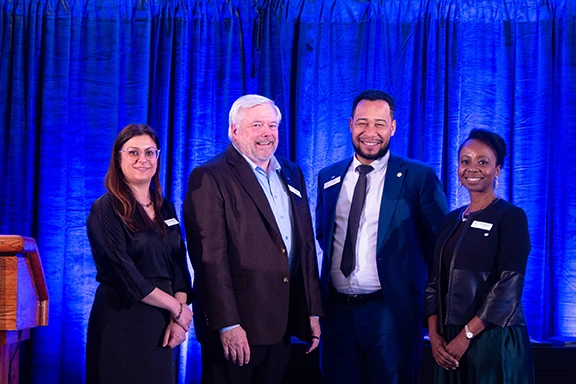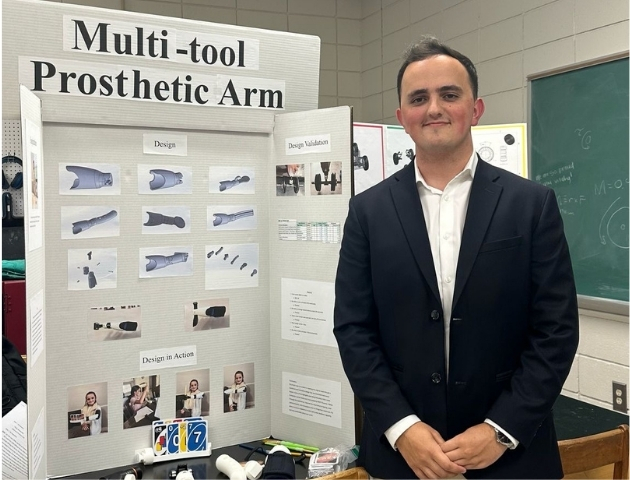Top Job Hunting and Career Tips for Engineers
Top Job Hunting and Career Tips for Engineers


Given their knowledge and expertise, recruiters can offer engineering students and early career engineers top professional development and job-hunting advice.
Technical recruiters have a unique insider perspective. They are connected to companies that are hiring and job seekers who need advice about how best to interact with those organizations that need to fill open positions. Engineering students and early career engineers can benefit from listening to these professionals who not only know and understand the hiring process but also understand what it takes to plan for career-related success.
Jeff Perry, a mechanical engineer and career development professional with Engineering Management Institute, recently hosted the ASME webinar for members, “Technical Recruiter Panel and Hiring Trends in the Industry.” He was joined by Tom Schaefer, mechanical engineer and CEO and principal consultant with SMG 9, and Simon Hobson who works both in the United States and the United Kingdom as a recruiter for In Technology Group.
The following are critical tips they offered to help an engineer not only find the next opportunity, but also develop a passion along their career journey.
Schaefer explained that any forward momentum that he has had in his career came as a result of not only being aware of his own interests, but the needs of the business where he was currently employed. Be open with managers about your aspirations, he suggested. When you do this you may be surprised to find that they will be willing to help. Some managers you work with may suggest the best way to prepare for that role you have as a goal. They may, for example, suggest a networking opportunity or a course you need to complete.
And if you do get the chance to work on a project that may be outside the scope of your primary responsibilities, take it, but also be ready to share what you accomplished. The information may cover the initiative you took to join the team. Or it may be the training you attended to get ready to take on the new task. Either way, don’t be shy, Shaefer said. Be sure to share your best moments that tell the story of how you work, how proactive you are, and how innovative your solutions can be.
Schaefer suggested that as you maneuver through an interview process—meet with individuals, study organizational charts, research the company’s goals, and learn about the group mission—that you also consider if the organization is a “good fit.” Research is important as a way to ensure a good interview and asking good questions during conversations, but what you learn should mean more than providing a good meeting performance.
“Do some serious introspection,” the experienced recruiter suggested. For example, look at the mission and ask if it is important to you, Schaefer said. This way as you dialogue with individuals your conversations will not only sound “authentic,” it will ring true. The questions will be real because you are interested in learning more, Schaefer said. When “you’re curious about what they’re doing and why” it shows, he explained.
Schaefer suggested that while you may understand every requirement listed in a job description, just saying you’ve “done that” may not be as convincing to those who are interviewing you as you may think. If you have done something, if you have experience with it, tell those you are meeting with “what you’ve done,” he said.
You may know, for example, product lifecycle management—that you are involved from prototype conceptual design all the way to launch. Develop a strategy to highlight your accomplishments and emphasize results, he said. Tell people what you accomplished, specifically did, what you took ownership of, and what initiative you have taken “that was proactive.”
As you go through this process you are being examined to find out if you are a good fit, but you must do the same. Schaefer said that you should learn as much as you can from the recruiter, and get together relevant questions about the role you are being recruited to fill. Deciding if you have “authentic interest” in the company and the opportunity is important.
Schaefer offered that if there’s a requirement of the job that you’re applying for that you’re not equipped for—“be self -aware.” It may be something that you see on your career path, but you may not be there yet. “Be honest,” he said. Everyone has accomplishments, likewise, everyone has those goals they are working toward.
 It may be something that you are really looking to do in the future. It is a goal that you are looking toward and maybe why you are interested in the role. You can make that case especially if that responsibility is a good reach for you. The point is that a stretch is one thing, but don’t just throw your resume at jobs that are really too much out of your area of expertise.
It may be something that you are really looking to do in the future. It is a goal that you are looking toward and maybe why you are interested in the role. You can make that case especially if that responsibility is a good reach for you. The point is that a stretch is one thing, but don’t just throw your resume at jobs that are really too much out of your area of expertise.
Simon Hobson makes the point that in the interview process you will eventually meet with an individual in senior leadership. “Whether it’s the COO, whether it’s the founder, or the president, nine times out of 10, for the person you’re speaking to, this company is either their baby or they are heavily invested in the business,” he said. If you can show them that “you’re just as interested and excited” as they are, you are going to do very well.
He pointed out that these leaders understand all the ins and outs of this business and where it’s going, and if they see that “someone’s got that hunger, you might be lacking a little bit on the skill set...[but] if you’re avidly interested in this business” people may be willing to take a risk and hire you.
What if all that research uncovers information that may offer a negative view of the organization offering an opportunity to you? “Sometimes there may be some bad stuff that you hear,” Hobson said. “Maybe there was bad leadership or maybe the work-life balance isn’t what you are expecting. Everybody has a different story no matter what company you work for so I would push for you to go and speak to the individuals and form your own opinion.”
Research in this case could be learning more from other sources—many online. And having realistic expectations for the jobs that you’re applying for is a large part of why researching a company is so important. “Take your time to find the right job for you that matches your skill set where you can come in and actually add value to the business,” Hobson said. When you eventually join the right business, you’re going to be able to make progress in your career a lot easier and quicker, he explained.
“Always treat people how you want to be treated,” Hobson said. “And that goes a very, very far way when you’re looking for a new job.” Whether that’s getting back to them after an interview process, or keeping communication open after accepting a job offer, it is all about building relationships in the industry, he explained.
The fact is that you never know when you will need that person, when you’ll need that reference, when you’ll need that mentorship or that little bit of information from somebody who knows something about a business that you need to know to make a sound decision. So, when you’re going to an interview give it 100 percent of yourself because that hiring manager can just as easily go to another business that you really want to work for, Hobson explained.
Always keep in mind the relationships and the network you are building, he said. And this works within teams as well. “[We all know] managers, trainees, engineers who [we’ve] worked with. They’re happy to go and share a coffee. They’re happy to go and grab lunch,” and that is simply because that person put their best foot forward.
Cathy Cecere is membership content program manager.
Jeff Perry, a mechanical engineer and career development professional with Engineering Management Institute, recently hosted the ASME webinar for members, “Technical Recruiter Panel and Hiring Trends in the Industry.” He was joined by Tom Schaefer, mechanical engineer and CEO and principal consultant with SMG 9, and Simon Hobson who works both in the United States and the United Kingdom as a recruiter for In Technology Group.
The following are critical tips they offered to help an engineer not only find the next opportunity, but also develop a passion along their career journey.
Job hunt where you work
Schaefer explained that any forward momentum that he has had in his career came as a result of not only being aware of his own interests, but the needs of the business where he was currently employed. Be open with managers about your aspirations, he suggested. When you do this you may be surprised to find that they will be willing to help. Some managers you work with may suggest the best way to prepare for that role you have as a goal. They may, for example, suggest a networking opportunity or a course you need to complete. And if you do get the chance to work on a project that may be outside the scope of your primary responsibilities, take it, but also be ready to share what you accomplished. The information may cover the initiative you took to join the team. Or it may be the training you attended to get ready to take on the new task. Either way, don’t be shy, Shaefer said. Be sure to share your best moments that tell the story of how you work, how proactive you are, and how innovative your solutions can be.
Authentic engineering interest
Schaefer suggested that as you maneuver through an interview process—meet with individuals, study organizational charts, research the company’s goals, and learn about the group mission—that you also consider if the organization is a “good fit.” Research is important as a way to ensure a good interview and asking good questions during conversations, but what you learn should mean more than providing a good meeting performance.“Do some serious introspection,” the experienced recruiter suggested. For example, look at the mission and ask if it is important to you, Schaefer said. This way as you dialogue with individuals your conversations will not only sound “authentic,” it will ring true. The questions will be real because you are interested in learning more, Schaefer said. When “you’re curious about what they’re doing and why” it shows, he explained.
Been there, done that
Schaefer suggested that while you may understand every requirement listed in a job description, just saying you’ve “done that” may not be as convincing to those who are interviewing you as you may think. If you have done something, if you have experience with it, tell those you are meeting with “what you’ve done,” he said. You may know, for example, product lifecycle management—that you are involved from prototype conceptual design all the way to launch. Develop a strategy to highlight your accomplishments and emphasize results, he said. Tell people what you accomplished, specifically did, what you took ownership of, and what initiative you have taken “that was proactive.”
As you go through this process you are being examined to find out if you are a good fit, but you must do the same. Schaefer said that you should learn as much as you can from the recruiter, and get together relevant questions about the role you are being recruited to fill. Deciding if you have “authentic interest” in the company and the opportunity is important.
Share career goals
Schaefer offered that if there’s a requirement of the job that you’re applying for that you’re not equipped for—“be self -aware.” It may be something that you see on your career path, but you may not be there yet. “Be honest,” he said. Everyone has accomplishments, likewise, everyone has those goals they are working toward. 
Simon Hobson makes the point that in the interview process you will eventually meet with an individual in senior leadership. “Whether it’s the COO, whether it’s the founder, or the president, nine times out of 10, for the person you’re speaking to, this company is either their baby or they are heavily invested in the business,” he said. If you can show them that “you’re just as interested and excited” as they are, you are going to do very well.
He pointed out that these leaders understand all the ins and outs of this business and where it’s going, and if they see that “someone’s got that hunger, you might be lacking a little bit on the skill set...[but] if you’re avidly interested in this business” people may be willing to take a risk and hire you.
Unwelcomed news
What if all that research uncovers information that may offer a negative view of the organization offering an opportunity to you? “Sometimes there may be some bad stuff that you hear,” Hobson said. “Maybe there was bad leadership or maybe the work-life balance isn’t what you are expecting. Everybody has a different story no matter what company you work for so I would push for you to go and speak to the individuals and form your own opinion.”Research in this case could be learning more from other sources—many online. And having realistic expectations for the jobs that you’re applying for is a large part of why researching a company is so important. “Take your time to find the right job for you that matches your skill set where you can come in and actually add value to the business,” Hobson said. When you eventually join the right business, you’re going to be able to make progress in your career a lot easier and quicker, he explained.
Act professionally
“Always treat people how you want to be treated,” Hobson said. “And that goes a very, very far way when you’re looking for a new job.” Whether that’s getting back to them after an interview process, or keeping communication open after accepting a job offer, it is all about building relationships in the industry, he explained. The fact is that you never know when you will need that person, when you’ll need that reference, when you’ll need that mentorship or that little bit of information from somebody who knows something about a business that you need to know to make a sound decision. So, when you’re going to an interview give it 100 percent of yourself because that hiring manager can just as easily go to another business that you really want to work for, Hobson explained.
Always keep in mind the relationships and the network you are building, he said. And this works within teams as well. “[We all know] managers, trainees, engineers who [we’ve] worked with. They’re happy to go and share a coffee. They’re happy to go and grab lunch,” and that is simply because that person put their best foot forward.
Cathy Cecere is membership content program manager.





